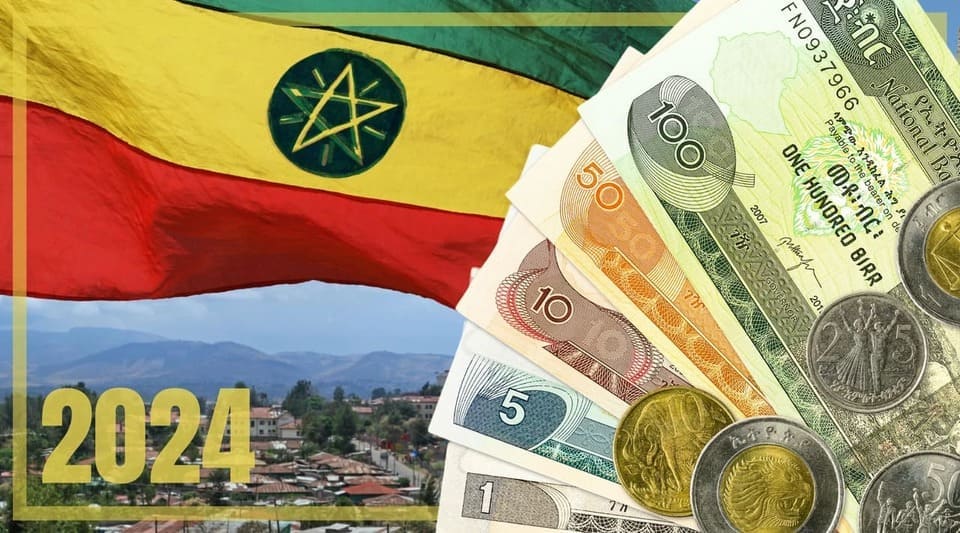The Ethiopian Birr (ETB) has been on a trajectory of seemingly terminal decline for several years now. Trading at 28.41 against the dollar in January 2019, at time of writing the Ethiopian currency was trading at practically half that level, at just 56.25. As the Addis Standard wrote last month, “the Ethiopian birr has plummeted to record lows […] the currency has declined over 100% versus the dollar in the last five years.” But what explains the profound weakness of the birr – and is there any hope of respite in the year ahead?
#Ethiopian Birr plummets to record low amid rising economic uncertainty
— Addis Standard (@addisstandard) December 12, 2023
The Ethiopian birr has plummeted to a record low, with the official rate hovering around 55 against the #US dollar this week, far surpassing this year's previous low of 53. The currency has declined over… pic.twitter.com/6vYrWUGHIq
The coronavirus pandemic was a particular hit to the Ethiopian economy currency – and the currency has struggled to recover since. The pandemic saw its export of goods and services drop by up to 30% and significantly reduced the amount of capital coming into the East African country through remittances from abroad. A World Bank report estimated that remittances to countries in Sub-Saharan Africa fell by 9% in 2020 and 6% in 2021.
This was a particular problem for the Ethiopian birr because both of these factors resulted in less foreign exchange coming into the country. Put simply, fewer US dollars relative to the existing supply of Ethiopian birr led to higher demand for a limited amount of dollars, driving up the value of the greenback.
These trends were exacerbated by the outbreak of war in the Tigray region in November 2020, which destroyed whole swathes of factories and industry and, as a result, cost Ethiopia approximately $20 million in monthly export revenues. This widening current account deficit has contributed to dwindling foreign exchange reserves and therefore the ongoing weakness of the birr.
A year after its peace agreement with #Ethiopia, Tigray needs billions of dollars to rebuild – https://t.co/FXQxkp7766 pic.twitter.com/NFZprDDE4h
— ADF Magazine (@ADFmagazine) November 5, 2023
It is of course true that Ethiopia is not the only African currency to experience weakness over the past few years. Emerging markets generally were badly hit at the start of the pandemic in early 2020, when a “flight to safety” amongst foreign investors encouraged mass capital inflows into the greenback or dollar-denominated assets.
Throughout the turbulence of the pandemic, the risk appetite of investors was highly limited and therefore assets perceived to be “high risk,” such as the Ethiopian birr, became less appealing. Then, the Federal Reserve’s decision to ramp up interest rates in the US reinforced this trend, with foreign exchange traders taking advantage of the higher yields on offer in American markets – to the detriment of emerging and frontier markets in Africa and elsewhere. The Nigerian Naira, Kenyan Shilling, Zambian Kwacha, and Angolan Kwanza have all been hit for similar reasons.
Most sub-Saharan African currencies have weakened against the US dollar, fanning inflationary pressures across the continent as import prices surge.https://t.co/BeYd3Y5q4z
— #DisruptionBanking (@DisruptionBank) January 17, 2024
However, the situation is arguably particularly bad in Ethiopia, making it less likely that the currency will be able to recover. Just last month, Addis Ababa failed to pay a $33 million bond coupon, days after the governor of the central bank had told the Ethiopian parliament that the country would avoid defaulting on its debts.
This unexpected default was despite the fact that earlier in 2023, Ethiopia’s single largest creditor, China, allowed the East African country to suspend debt repayments on bonds maturing in the 2023-24 fiscal year. This, combined with the fact that Ethiopia has relatively low levels of external debt, had led to speculation that the real reason for Ethiopia’s debt default is simply governmental incompetence. Will foreign traders be prepared to hold the currency of a government which many fear is out of its depth?
Given all of this, it seems unlikely that there is much prospect of the birr strengthening in 2024. Particularly with the Ethiopian government raising the risks for foreign investors in East Africa as a result of its Red Sea deal with Somaliland, which is causing serious tensions with neighbouring Somalia and Djibouti, it is unlikely that there will be significant capital inflows into Addis Ababa this year.
















One Response
Ethiopian men scientists need to create nuclear bomb to gate all economic and political equality with any part of the world, i am 100 % sure Ethiopian scientists able to do that a siding there personal problems